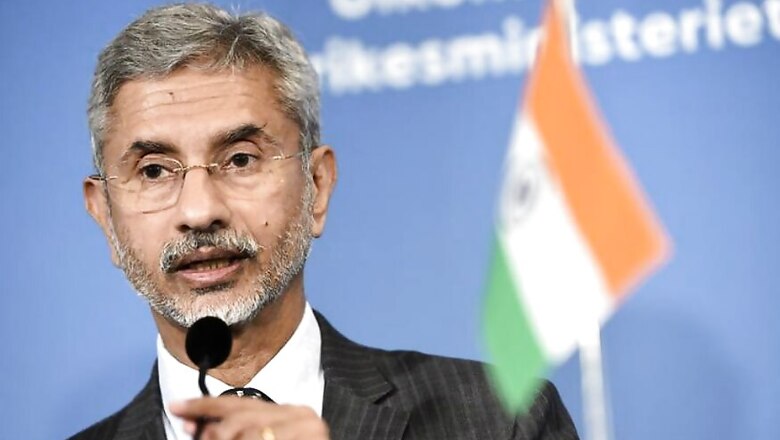
views
External Affairs Minister S Jaishankar said on Monday that non-alignment was for a specific era and added that India is no longer a bystander as it has a contribution to make in key issues, including connectivity, maritime security, terrorism, climate change. Jaishankar made the remark during an online interaction with strategic affairs expert Prof C Raja Mohan and eminent industrialist Sunil Kant Munjal at the Mindmine Summit.
In the discussion, Jaishankar spoke on a range of themes such as the rise of China, the relevance of non-alignment movement and the multi-polar world order.
Edited Excerpts:
Prof C Raja Mohan: It’s been said diplomacy is like banking. It’s about building a deposit of goodwill used when necessary.
S Jaishankar: There’s one more common point between diplomacy and banking, both run very much on trust and so the capital you build is very much a function of trust you generate and credibility. It’s been a long journey but it doesn’t feel that way. Every day the world changes. I think it’s a huge advantage to be a minister in the department you’ve spent all your life working. I know my colleagues and issues.
The world today is so challenging. There are three reasons for that — One, there’s enormous rebalancing over these forty years. If we look at the top 10 economies or the other way around, they have changed. Second, the world has globalised. We are so interpenetrative, interdependent. We are far more connected than we were before. Third, the metrics of influence, power and diplomacy that has changed. We have economics to judge influence. It isn’t just that the players have changed but the entire landscape has changed.
Prof C Raja Mohan: Minister, when you joined the foreign service 40 odd years ago, there were two big honchos... Now, what Sunil is saying we are back to two — US and China.
S Jaishankar: I think there was bipolarity then, not absolute though. There’s some kind of bipolarity even today but we are moving towards a multi-polar world. Clearly, US-China would be more influential than others, but I would still say that earlier the bipolar world had multi-polar characteristics, this time it's going to be the other way round.
Prof C Raja Mohan: Many believe that they underestimated the speed and rise of China. Do you agree with it?
S Jaishankar: In 1988, when Rajiv Gandhi went to China, who was the first prime minister to visit after the war. Both countries had the same economy. Today, China’s economy is five times of India. We’ve grown too. China has posted a very impressive record, give them credit. We should also reflect on our own growth too.
Maybe we could have done a lot better in certain areas though we remained highly focused on industrialisation. The fact is we opened up a decade later than China did. Other reforms in the field of governance, administration, social has been commendable too. In many ways, they were much more aggressive about leveraging work. Whether it was about going through with the reform agenda in a 360 way, looking at the world as to how to advance our interest in a focused way; these have created a gap between the two countries.
Prof C Raja Mohan: The way China thinks about the world seems to have changed too. Do you think our establishment still thinks in the old way, commensurate with our own sized economies?
S Jaishankar: We are in transition. I’ve been here for forty years and have seen the change in the way people think. An example can be; we do development partnership programs with different countries. Today, our reach is from the Caribbean to South Pacific. We have projects in 51 countries. It would have been impossible 40 years ago. It's not that we aren’t becoming more influential, the issue of growth is relative. For us, challenges really are about taking deep reforms in all the industries. This comparison with China is motivation.
Prof C Raja Mohan: Non-alignment today is defined as being away from UN. What are our steps in that direction?
S Jaishankar: Non-alignment was for a specific era and a particular context. There were two aspects to it. One, independence. I think that remains the factor of our continuity. The other came in the 50s and 60s when we were much weaker. But today, people turn to us for solutions. We are not the bystander and have a contribution to make. Connectivity, maritime security, terrorism, climate change are big issues and we are a part of the discussion. And third, we are to grow by leveraging international situation. And you can’t do that by staying away. The era of great caution and much greater sense on multilateral relations is behind us. We need to take risks.
Prof C Raja Mohan: The importance of France and Japan seems to have grown in our foreign policy today.
S Jaishankar: Some of this is a consequence of the repositioning of the US. The big umbrella is now either smaller or less thick than it used to be. It’s allowed other countries to play much more autonomous rules.
It doesn’t affect us so much because we were never part of an alliance system and we will never be. But the countries that were dependent on American decision making today are found to be self-dependent on decision-making. Second, again is the rise of China.
Much more room has opened up for middle powers. Even if you have a look at G20 players, they seem to be playing a much greater role. Many things are decided regionally today than they were ten years ago, like in North Africa and the Gulf.


















Comments
0 comment